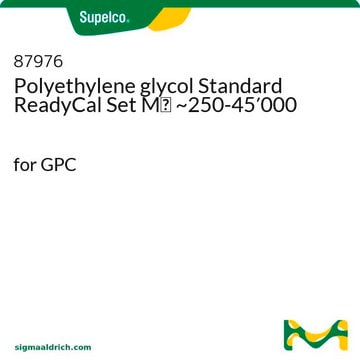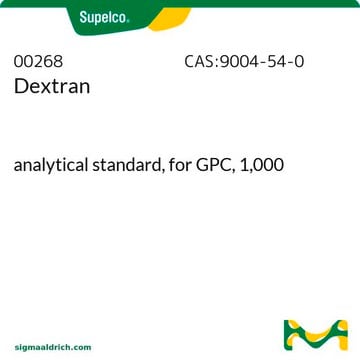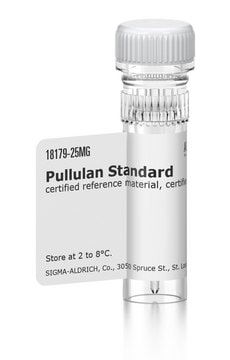81201
Poly(éthylène glycol)
analytical standard, for GPC, 108,000
Synonyme(s) :
PEG
About This Item
Produits recommandés
Qualité
analytical standard
for GPC
Niveau de qualité
Durée de conservation
limited shelf life, expiry date on the label
Poids mol.
Mn ~96500
Mp ~111000
Mw ~108000
Technique(s)
gel permeation chromatography (GPC): suitable
Mw/Mn
~1.12
Application(s)
cleaning products
cosmetics
food and beverages
personal care
Format
neat
Température de stockage
2-8°C
Chaîne SMILES
C(CO)O
InChI
1S/C2H6O2/c3-1-2-4/h3-4H,1-2H2
Clé InChI
LYCAIKOWRPUZTN-UHFFFAOYSA-N
Vous recherchez des produits similaires ? Visite Guide de comparaison des produits
Description générale
Code de la classe de stockage
10 - Combustible liquids
Classe de danger pour l'eau (WGK)
WGK 1
Point d'éclair (°F)
281.5 °F - closed cup
Point d'éclair (°C)
138.6 °C - closed cup
Équipement de protection individuelle
Eyeshields, Gloves, type N95 (US)
Faites votre choix parmi les versions les plus récentes :
Déjà en possession de ce produit ?
Retrouvez la documentation relative aux produits que vous avez récemment achetés dans la Bibliothèque de documents.
Les clients ont également consulté
Notre équipe de scientifiques dispose d'une expérience dans tous les secteurs de la recherche, notamment en sciences de la vie, science des matériaux, synthèse chimique, chromatographie, analyse et dans de nombreux autres domaines..
Contacter notre Service technique



